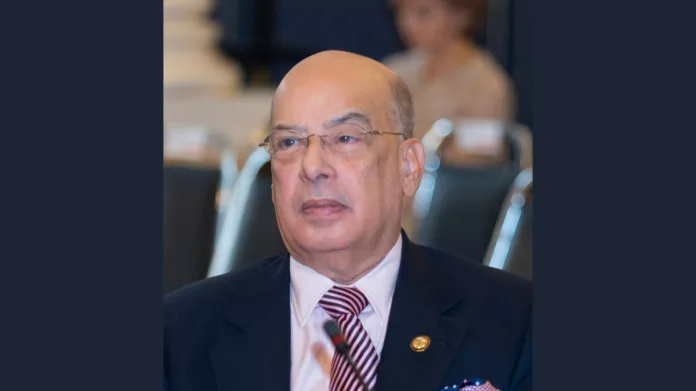By Robert A. Emmanuel
Antigua and Barbuda’s Ambassador to the Organisation of American States (OAS), Sir Ronald Sanders, said chairing the OAS’s working group on Haiti would require his full attention, as he explained his decision to withdraw from the group.
Sir Ronald, who was selected to initially serve on a 14-member working group to study the ongoing situation in Haiti, said that he already serves in various capacities which would take his attention away from an issue that, in his opinion, “would take a lot of full-time activity”.
Ambassador Sanders not only serves as the OAS Ambassador for Antigua and Barbuda, but he is also the non-resident Ambassador to Canada as well as the Ambassador to the United States.
“In addition to that, I continue to write papers for the Ministry of Foreign Affairs and the Prime Minister’s Office, and I simply do not have the time to devote to [the working group], so if I would not be able to give it the fullness of attention that I think the Haitian problem requires [it is my duty to withdraw],” he stated.
The working group on Haiti was announced on February 17 by a resolution of the OAS Permanent Council, where issues of gun-trafficking and a proposed multinational force to support the Haitian police were discussed.
Ambassador Sanders has been a leading voice on the issue of Haiti, writing several papers on the matter.
Haiti, in recent years, has faced assassinations of top political leaders, increased gang violence, and even protests from its own national police force.
Gang violence in Haiti has been a particular issue as many gangs have expanded their territorial control of the capital, Port-au-Prince, with media reports revealing that at least 60 percent of the capital and its surrounding areas is controlled by gangs.
Caribbean and international leaders continue to be perplexed by how exactly to address the crisis, which for many regional leaders has a direct impact on their own countries.
On Monday, a high-level delegation of Caricom leaders led by Jamaican Prime Minister Andrew Holness, travelled to Haiti on a one-day working visit, meeting with current Haitian President Dr Ariel Henry, the Director General of the Haitian National Police, and other political and civil society leaders.
After the assassination of Haiti’s President Jovenel Moïse in 2021, Dr Henry took over as the country’s leader, and he now serves as the country’s acting Prime Minister and President.
Ambassador Sanders explained that Caricom will continue to try every measure possible to assist and support Haiti, especially in restoring democratic rule, but he warned that without political stability in the country, any effort may be futile.
“The Caribbean is very well aware that Haiti is in a situation of crisis; the fact that over 200 gangs have now virtually taken over the country and is now the de facto government because the government in office at the moment is not an elected government.
“The problem is how does anyone do anything in Haiti? To do anything, you first of all have to have an invitation from an authority in Haiti to participate in their country, and for years, the Caricom heads of government have been asking Haiti for that invitation, but that formal invitation has never come,” he said.
He added that the situation in Haiti requires a heavy burden of resources which the region simply cannot afford.
“Haiti has a population … that is bigger than all of the population of the rest of Caricom together, so you understand the enormity of this problem; it requires resources that Caricom simply does not have,” he said.
Meanwhile, intervention by larger countries such as the United States and Canada has been called for by some regional leaders.
Al Jazeera reported that United Nations (UN) Secretary-General Antonio Guterres called for “armed action”, while UN special envoy for Haiti, Helen La Lime, said she hoped the UN Security Council would deal “positively” with the pending request from Haiti’s government for international armed forces.
CBC news reported last year that Canadian Prime Minister Justin Trudeau was receptive to establishing a Canadian military mission on the ground in Haiti, but said that there must be “consensus across political parties in Haiti”.
Ambassador Sanders explained that any potential consensus from the international community has been made even more difficult by the ongoing war in Ukraine.
“Caricom does not have the resources to finance change in a country of over 11 million people; that money has to come from the countries which, in part, have been most responsible for the difficulties that Haiti has today…principally France and the United States of America, and also Spain and the United Kingdom.
“The difficulty is that the only agency in the world that can make a decision that overrides is the United Nations Security Council, and [they] have considered Haiti up to December last year and keep kicking that can down the road, because there has been no agreement on how to proceed,” Sir Ronald explained.
He noted that with such a divided Security Council, invocation of chapter seven of the UN Charter—which allows the UN Security Council to decide on measures to restore international peace—cannot occur.
“There is no agreement between the five major players with veto [powers], so therefore, effectively, the many actions under article seven of the UN Charter, which is the only way under international law that action could be taken in Haiti, is just stymied,” he expressed.

